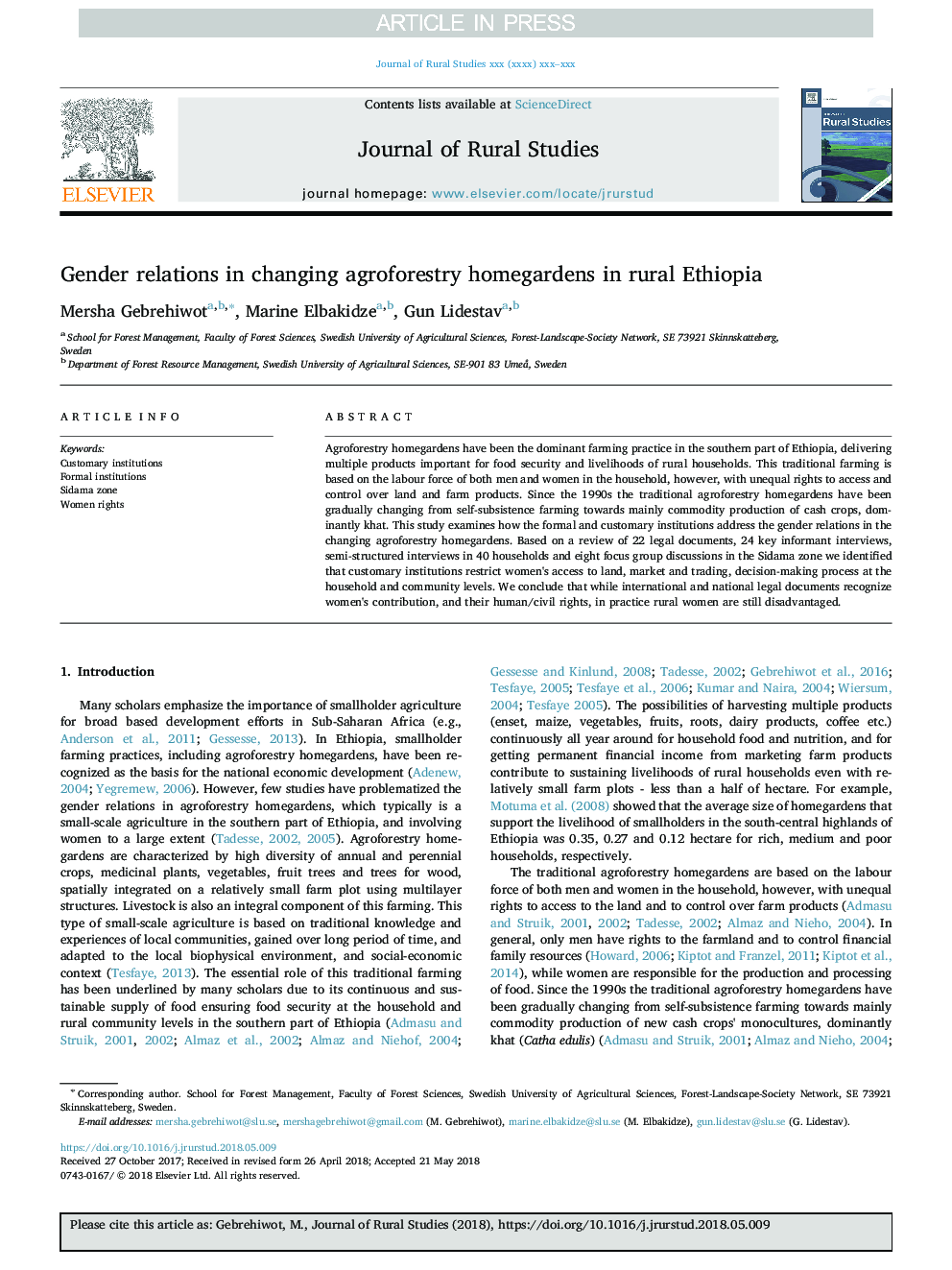| کد مقاله | کد نشریه | سال انتشار | مقاله انگلیسی | نسخه تمام متن |
|---|---|---|---|---|
| 6545249 | 1421770 | 2018 | 9 صفحه PDF | دانلود رایگان |
عنوان انگلیسی مقاله ISI
Gender relations in changing agroforestry homegardens in rural Ethiopia
ترجمه فارسی عنوان
روابط جنسیتی در تغییر باغ های جنگلی در اتیوپی روستایی
دانلود مقاله + سفارش ترجمه
دانلود مقاله ISI انگلیسی
رایگان برای ایرانیان
کلمات کلیدی
موسسات عادی، موسسات رسمی، منطقه سیداما، حقوق زنان،
ترجمه چکیده
خانه های باغبانی جنگل های زراعتی در بخش جنوب شرقی اتیوپی عملگرایی کشاورزی بوده و محصولات متعددی را برای امنیت غذایی و معیشت خانواده های روستایی مهم تلقی می کنند. این کشاورزی سنتی بر اساس نیروی کار مردان و زنان خانوار است، با این حال، با حقوق نابرابر برای دسترسی و کنترل زمین و محصولات مزرعه. از دهه 1990، خانه های باغ وحش سنتی کشاورزی به تدریج از کشاورزی خودمختاری به سمت تولید کالاهای نقدی، عمدتا کت، تغییر می کند. این مطالعه به بررسی اینکه چگونه نهادهای رسمی و عادی در روابط جنسیتی در باغ وحش های جنگل زراعی تغییر می یابند. بر اساس بررسی 22 اسناد حقوقی، 24 مصاحبه کلیدی خبرنگاران، مصاحبه نیمه ساخت یافته در 40 خانوار و هشت بحث مباحث گروهی در منطقه سیداما مشخص کرد که موسسات عادی، دسترسی زنان به زمین، بازار و تجارت، تصمیم گیری را در خانواده و سطح جامعه. ما نتیجه می گیریم که در حالی که اسناد قانونی بین المللی و ملی به تشخیص مشارکت زنان و حقوق انسانی و مدنی آنها در عمل، زنان روستایی هنوز هم محروم هستند.
موضوعات مرتبط
علوم زیستی و بیوفناوری
علوم کشاورزی و بیولوژیک
جنگلداری
چکیده انگلیسی
Agroforestry homegardens have been the dominant farming practice in the southern part of Ethiopia, delivering multiple products important for food security and livelihoods of rural households. This traditional farming is based on the labour force of both men and women in the household, however, with unequal rights to access and control over land and farm products. Since the 1990s the traditional agroforestry homegardens have been gradually changing from self-subsistence farming towards mainly commodity production of cash crops, dominantly khat. This study examines how the formal and customary institutions address the gender relations in the changing agroforestry homegardens. Based on a review of 22 legal documents, 24 key informant interviews, semi-structured interviews in 40 households and eight focus group discussions in the Sidama zone we identified that customary institutions restrict women's access to land, market and trading, decision-making process at the household and community levels. We conclude that while international and national legal documents recognize women's contribution, and their human/civil rights, in practice rural women are still disadvantaged.
ناشر
Database: Elsevier - ScienceDirect (ساینس دایرکت)
Journal: Journal of Rural Studies - Volume 61, July 2018, Pages 197-205
Journal: Journal of Rural Studies - Volume 61, July 2018, Pages 197-205
نویسندگان
Mersha Gebrehiwot, Marine Elbakidze, Gun Lidestav,
